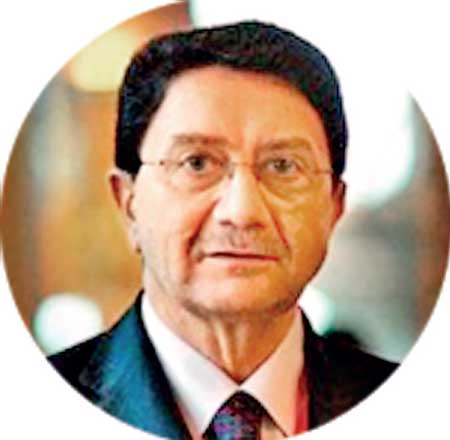Wednesday Feb 25, 2026
Wednesday Feb 25, 2026
Friday, 5 May 2017 00:00 - - {{hitsCtrl.values.hits}}
PATA Annual Summit 2017, a four-day event that brings together thought leaders and travel and tourism industry professionals from around the world under one theme ‘Disruption. Innovation. Transformation: The Future of Tourism’ is all set to take off in Negombo, Sri Lanka from 18-21 May. The key focus of PATA Annual Summit 2017 will be on constantly evolving travel and tourism landscape challenged by disruption, continuous innovation and transformation. Deciding the future of the tourism industry in the face of these major changes in the tourism landscape will be the forum for speakers at the conference.
Managing disruption through innovation and embracing disruption to ensure success of tourism industry in future are two key topics under discussion and debate during the PATA Annual Summit on 19 May.
As a simple definition, disruption is any development that upgrades or replaces an outdated product or service or overturns traditional business models. Tourism is one of the major industries affected by continuous disruption taking place in the world in various areas of the travel industry on daily basis. In the past few years, the travel industry has experienced its fair share of disruption. Traveller autonomy has increased and preferences have evolved, while technologies have advanced and new companies and models have dramatically changed the way we think about and conduct the business of travel.
The tour operators and travel agents are being challenged by emerging competitors that have embraced technology-enabled innovations, including aspects that are associated with the collaborative or sharing economy (e.g. Airbnb and Uber). A variety of suppliers across the supply chain are now able to form a direct connection with customers through platform websites, thereby providing tech-savvy tourists with the capacity to create customised trips. Incumbent tour operators and travel agents are now competing with emerging entrants that are responsive to customer needs because of their digital expertise.
As the various provider categories have become less clear and as barriers to entry have fallen, tour service suppliers must consider the contemporary tourism ‘ecosystem’ when formulating strategies. Amidst the declining consumer demand for standardised tour products, there is an urgent need to consider changing tourist habits or tastes when introducing new in-destination options. In exploring the evolving features of the inbound tourism ecosystem, can be addressed only through ‘Innovation’, with distinguishing characteristics of developing innovative tour service and experiences. It identifies how tour suppliers respond to competitor actions, or embrace these features themselves.
For an Asian country like Sri Lanka, the income generated by the tourism industry is a major contributor for its GDP growth. Disruptive trends created across various sectors of the travel and tourism industry such as destination marketing, airlines, hotels, tour operators etc pose a major challenge for Sri Lankan travel agents, tour operators and related stakeholders.
For all players in the travel industry it is imperative to find the correct and apt strategy to face these challenges created by disruption. The ability to identify, assess and develop sustainable tourism strategy for disruption through innovation and embracing the challenges would be the key to success of tourism industry of Sri Lanka.
The speakers at the PATA conference day on 19 May will share their experience through multiple case studies approach and assemble evidence from world tourism with implications for practitioners and suggestions for future development. Managing Disruption through Innovation will highlight the disruptive trends currently happening in the industry, and share their ideas and thoughts on how destinations, airlines, hotel companies, tour operators and attractions can begin to transform their operations and broader engagement to better compete and grow more sustainably.
 Dr. Taleb Rifai is Secretary-General of the World Tourism Organisation (UNWTO). He began his four-year term on 1 January 2010 and has been elected to a second four-year term, starting January 2014, by the 20th Session of UNWTO General Assembly held in August 2013. Rifai has an extensive background in international and national public service, the private sector and academia.
Dr. Taleb Rifai is Secretary-General of the World Tourism Organisation (UNWTO). He began his four-year term on 1 January 2010 and has been elected to a second four-year term, starting January 2014, by the 20th Session of UNWTO General Assembly held in August 2013. Rifai has an extensive background in international and national public service, the private sector and academia.
Positions held include: Assistant Director General of the International Labour Organization (ILO), several ministerial portfolios in the Government of Jordan (Minister of Planning and International Cooperation, Minister of Information and Minister of Tourism and Antiquity), CEO of Jordan’s Cement Company, Director of the Economic Mission to Washington DC and Director General of the Investment Promotion Corporation of Jordan.
Rifai was involved in research, teaching and practising Architecture and Urban Design in Jordan and the USA. He has a PhD in Urban Design and Regional Planning from the University of Pennsylvania in Philadelphia, an M.A. in Engineering and Architecture from the Illinois Institute of Technology (IIT) in Chicago, and a B.Sc. in Architectural Engineering from the University of Cairo in Egypt.

Drawing on insights and trends around branding, marketing and stakeholder engagement, this presentation will demonstrate how destinations and travel and tourism companies can better navigate disruption and innovate their products and services.
Jason is a Senior Vice President within the Ipsos Global Reputation Center and is responsible for the firm’s Corporate Reputation Practice in the United States. Jason was a senior executive at Booz Allen Hamilton. He is a veteran in commercial market Enterprise Intelligence and Insights (EI2) practice, developing corporate reputation strategies, designing comprehensive geopolitical risk assessments, improving business intelligence platforms, and developing global commercial strategy and organisational change management solutions for clients in the healthcare, financial services, energy, consumer packaged goods and retail industries.

Rafat Ali is the Founder and CEO of Skift, USA – the largest business intelligence and marketing platform in travel, providing news, information, data, and services to all sectors of the world’s largest industry. Skift deciphers and defines global travel trends for marketers, strategists and technologists in the global travel industry. He was previously the founder/CEO of Paid Content and ContentNext with vast experience on travel based technology methods and services. Prior to that, he was managing editor of Silicon Alley Reporter.
Rafat was the Knight Fellow at Indiana University, where he completed his Masters in Journalism, 1999-2000. Prior to that he completed his BSc in Computer Engineering, from AMU in Aligarh, India.
 Greg Klassen is a tourism industry strategist with 20+ years of leadership experience with blue chip organisations, including Canada’s national destination marketing agency, the Canadian Tourism Commission (CTC), AT&T and TELUS, Greg is an expert in the development and execution of marketing strategies leveraging new technologies. At Twenty31 he advises senior leadership teams on competitive destination marketing strategies, brand positioning and investment opportunities.
Greg Klassen is a tourism industry strategist with 20+ years of leadership experience with blue chip organisations, including Canada’s national destination marketing agency, the Canadian Tourism Commission (CTC), AT&T and TELUS, Greg is an expert in the development and execution of marketing strategies leveraging new technologies. At Twenty31 he advises senior leadership teams on competitive destination marketing strategies, brand positioning and investment opportunities.
He is a renowned thought leader on disruption in destination marketing and the links between travel and tourism and economic development. While at the CTC, Greg led the enhancement of Canada’s Future Brand ranking from 12th to 1st position, positioning Canada as the most recommended destination in the world to visit according to Reputation Institute. For his efforts, Greg was recognised as one of the tourism industry’s top marketers. The key topics discussed and debated at the inaugural sessions have much relevance for the professionals of Sri Lanka Tourism industry. The insights shared by the eloquent panel of speakers on the first conference day 19 May will no doubt contribute to improved performance, decision making and developing the tourism industry amidst the contemporary challenges faced.